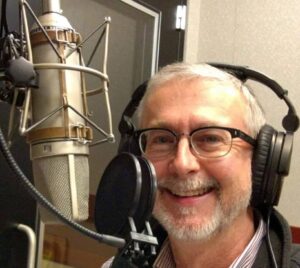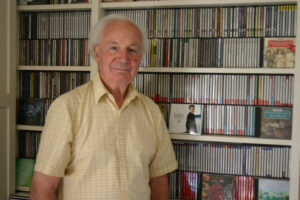
Peter DuBois recording WXXI’s ‘With Heart and Voice’
A decades-long legacy of sacred choral and organ music in Rochester, New York endures through host Peter DuBois, connecting communities across the public radio airwaves.
Sunday mornings can be a time for many to rejoice — some in communion together at a worship service and others in quiet reflection. For some, it’s done alongside a radio program broadcasting from WXXI Classical in Rochester, New York. With Heart and Voice — a long-running celebration of sacred choral and organ music — has touched listeners across the country for nearly 50 years.
The program blends reverence and artistry, embodying the power of music to inspire, connect, and reflect the depth of human experience. Its current host, Peter DuBois, calls upon decades of experience. “I’ve been a professional church musician for my whole career and actually just retired last year after 42 years,” he says, sharing that his work with the show allows him to continue that love of the music. “It’s an ever-growing kind of field, and it keeps me interested.”
Noncommercial radio, DuBois notes, creates opportunities for shows like With Heart and Voice to thrive. He mentions that the program remains popular both locally and nationally, supported both by syndication and local support. Nearly 125 stations across the country currently carry With Heart and Voice. “And I get emails from all over the country and even overseas,” he says.
Rochester’s strong musical culture also fuels the show. “[The city] probably has more community choral organizations than any or many metro areas of this size,” he says, citing the influence of the well-regarded Eastman School of Music at the University of Rochester.

‘With Heart and Voice’ founder, Richard Gladwell, in front of his vast CD collection that forms the fabric of the show.
With Heart and Voice first took shape in 1975, thanks to its founder and original host, Richard Gladwell. A British expatriate who sang in a London boy choir and later moved to Rochester to work for Kodak and Xerox, Gladwell had a deep love of Anglican choral music. “He was just a very colorful character and had great stories about his experience with Anglican music and his experiences as a Brit through World War II” DuBois says. By 1989, the show had entered national syndication, attracting stations across the country to Gladwell’s mix of organ music, anthems, and hymns.
DuBois discovered the show when he first moved to Rochester. “I do remember when I was a student at Eastman hearing the program on Sunday mornings,” he recalls. After stints in Michigan and West Virginia, he moved back to Rochester in 1991 and got to know Gladwell personally. “We would encounter each other around town and have interesting conversations about choral music and church music in general and just stories.”
Eventually, Gladwell’s health issues left the program’s future uncertain. DuBois recounts a casual conversation that later guided the transition: “In passing, [Gladwell] asked if I would have any interest in taking over the program when he could no longer do it. And I said, ‘Oh, I don’t know. […] That’s not a thought that ever crossed my mind. I’ve never done broadcasting.’” But when Gladwell could no longer host in 2009, DuBois stepped up and began hosting the program.
He soon encountered Gladwell’s vast personal archive of more than 4,500 CDs — with no formal organization system. “He had a system for the way that the CDs were on the shelves by label and catalog number and all that kind of stuff, but they were not cataloged because he had 4500 CDs. None of it cataloged except in his head,” DuBois says. WXXI adopted Gladwell’s collection, but allowed it to stay in DuBois’s home. Over time, he has added nearly 3,000 more recordings of his own.
DuBois admits that hosting a syndicated program was initially a daunting shift from his long career directing church choirs. “It’s kind of embarrassing to go back and listen to some of those early recordings because it was pretty stilted,” he laughs, “It feels much more comfortable now. I feel like I can be more conversational in the way I present things.” Yet he finds fulfillment in connecting listeners to repertoire they might not otherwise hear. “I’m working with some of the same material that I would work with in a church or in a concert setting,” he says.
DuBois has broadened the scope of the show based on that experience, noting that it began rooted in Anglican repertoire. “[Richard] wasn’t real keen on American choral stuff,” he says, noting that he’s expanded that side of the library, along with others. He sometimes features music from Jewish, Muslim, or other religious and spiritual traditions, recalling how a listener’s request prompted him to create a program around peace and justice in multiple faiths. “I do have recordings of music from all those traditions. So it was kind of fun to explore that a little bit,” he says.
After more than a decade in front of the microphone, DuBois still finds new material worth sharing. “I keep discovering new composers or recordings,” he says of his extensive additions to the collection. He also retains a sense of gratitude for the show’s legacy, knowing Gladwell’s vision set the stage for the program’s enduring appeal.
From the thousands of recordings in his basement library to the supportive environment of public radio, DuBois remains committed to keeping With Heart and Voice vital for audiences near and far. “It has pretty broad appeal,” he reiterates, noting it might seem like a niche program, “but people tune in from all over.”
Through the voices of local and global choirs, the resonance of organs, and the thousands of performances DuBois has at his disposal, the show continues to bring people together — one hymn at a time. It remains a testament to the power of not just sacred music, but public radio as a whole to enrich even the oldest traditions.
“It’s really just continuing to discover things even now that I wish I could do with my church choir, new repertoire that’s coming out, new recordings of old music that capture it in a way,” DuBois says. For those listeners eager to gather around—even from a distance— and take in that ever-evolving sense of reverence and artistry, With Heart and Voice will continue to welcome them.